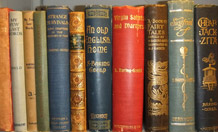
Books from the library of the Reverend Sabine Baring-Gould
Students and locals to benefit from major historic library
University of Exeter students, academics and local people are set to benefit from the acquisition of the library of the Reverend Sabine Baring-Gould.
Best known for writing the well-loved hymn Onward Christian Soldiers, this Exeter-born clergyman, folklorist, writer and Icelandic scholar was, from 1881 until his death in 1924, parson and squire of Devon’s Lewtrenchard Manor.
The Baring-Gould Library holds around 3,000 valuable and important books, some very ancient. Since the 1970s the library has been on loan to the National Trust and was housed in the beautiful and atmospheric setting of Killerton House Library, near Exeter. The National Trust now wants to create a new library for public use and so the Baring-Gould collection is moving to the University Library, to join its most prized books and archives.
The move will effectively transform the library from a visually appealing house collection to a living research resource that will offer enormous possibilities for researchers into 19th-century literature, Icelandic studies, 17th and 18th century music, traditional folk song and history, topography and dialect.
Merriol Baring-Gould Almond, Baring-Gould’s great grand-daughter, said: “Although we are sad that the Sabine Baring-Gould collection is losing its magnificent home at Killerton we are happy that its relocation to the University on long-term loan will provide continued security for the collection and much improved access to the content of the books under controlled conditions. The Baring-Gould family would like to thank Christine Faunch, Martin Graebe, Ian Maxted, Nick Groom and Regenia Gagnier, and everyone involved for all that has been done, and all that will be done, to achieve this."
The Library will be located in the University of Exeter’s Heritage Collections. Once the books have been catalogued they will be available for students and members of the public in the reading room, with the existing special collections, such as John Betjeman’s working library, the Syon Abbey archive and historic parish collections from around Devon.
The majority of the books in the Baring-Gould library were collected or written by Baring-Gould himself, who produced over 200 books, including the series Lives of the Saints, the Vicar of Morwenstow. However, he regarded his principal achievement to be the collection of folk songs that he made with the help of the ordinary people of Devon and Cornwall.
Christine Faunch, Head of Heritage Collections at the University commented: “The University of Exeter is uniquely placed to take the library which contains an exceedingly broad spectrum of research appeal from Icelandic scholarship and travel books to books concerning our own region’s history and people. It will significantly augment our own extensive holdings by west-country writers on campus and those in the library of the Devon and Exeter Institution (DEI) set up in 1813, now managed by the University and housing an important collection of books about the county of Devon and the city of Exeter”.
Researchers into Baring-Gould’s life and work will welcome the creation of this new resource which is the fourth major collection of his work in Devon, the county in which he was born. The other resources are at the Devon Record Office, Exeter, The Plymouth and West Devon Record Office and the Francis Nicolle Collection, housed in Plymouth City Library.
Date: 21 August 2012
